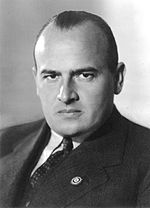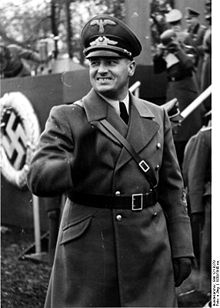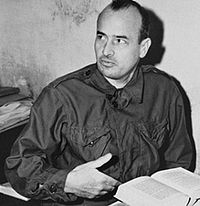- Hans Frank
-
Hans Frank 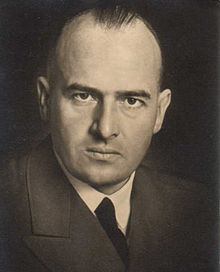
Hans Frank, photograph by Heinrich Hoffmann Governor-General of the General Government In office
26 October 1939 – January 1945Personal details Born 23 May 1900
Karlsruhe, Baden, GermanyDied 16 October 1946 (aged 46)
Nuremberg, GermanyNationality German Political party National Socialist German Workers' Party (NSDAP) Spouse(s) Brigitte Herbst (married 1925) Hans Michael Frank (23 May 1900 – 16 October 1946) was a German lawyer who worked for the Nazi party during the 1920s and 1930s and later became a high-ranking official in Nazi Germany. He was prosecuted during the Nuremberg trials for his role in perpetrating the Holocaust during his tenure as the Governor-General of that portion of occupied Poland that was not directly incorporated into the German Reich, although administered by the Nazis, and known as the General Government. He was found guilty of war crimes and crimes against humanity and executed in Nuremberg.
Contents
Pre-war career
Frank was born in Karlsruhe, and his parents were Karl Frank, a lawyer, and his wife Magdalena (née Buchmaier). He had an older brother, Karl Jr., and a younger sister, Elisabeth. He joined the German army in 1917, during World War I. After the war he served in the Freikorps under the command of Franz Ritter von Epp, and then joined the German Worker's Party (which soon evolved into NSDAP), in 1919, and was one of the party's earliest members.
He studied law, passing the final state examination in 1926, and rose to become Adolf Hitler's personal legal adviser. In this capacity, Frank was privy to personal details of Hitler's life. In his memoirs, written shortly before his execution, Frank made the sensational claim that he had been commissioned by Hitler to investigate Hitler's family in 1930 after a "blackmail letter" had been received from Hitler's nephew, William Patrick Hitler, who allegedly threatened to reveal embarrassing facts about his uncle's ancestry. Frank said that the investigation uncovered evidence that Maria Schicklgruber, Hitler's paternal grandmother, had been working as a cook in the household of a Jewish man named Leopold Frankenberger before she gave birth to Hitler's father, Alois, out of wedlock. Frank claimed that he had obtained from a relative of Hitler's by marriage a collection of letters between Maria Schicklgruber and a member of the Frankenberger family that discussed a stipend for her after she left the employ of the family. According to Frank, Hitler told him that the letters did not prove that the Frankenberger son was his grandfather but rather his grandmother had merely extorted money from Frankenberger by threatening to claim his paternity of her illegitimate child.[1] Frank accepted this explanation, but added that it was still just possible that Hitler had some Jewish ancestry. Nevertheless, he thought it unlikely because, "...from his entire demeanor, the fact that Adolf Hitler had no Jewish blood coursing through his veins seems so clearly evident that nothing more need be said on this."[2]
Given that all Jews had been expelled from the province of Styria (which includes Graz) in the 15th century and were not allowed to return until the 1860s, scholars such as Ian Kershaw and Brigitte Hamann dismiss the Frankenberger hypothesis, which before had only Frank's speculation to support it as baseless.[3][4][5][6] There is no evidence outside of Frank's statements for the existence of a "Leopold Frankenberger" living in Graz in the 1830s, and Frank's story is notably inaccurate on several points such as the claim that Maria Schicklgruber came from "Leonding near Linz", when in fact she came from the hamlet of Strones near the village of Döllersheim.[7] It has been suggested that Frank, who turned against National Socialism after 1945, remained an anti-Semitic fanatic, made the claim that Hitler had Jewish ancestry as way of proving that Hitler was thus really a "Jew" and not an "Aryan"; and in this way, "proved" that the crimes of the Third Reich were the work of the "Jewish" Hitler.[8] The full anti-Semitic implications of Frank's story were borne out in a letter to the editor of a Saudi newspaper in 1982 by a German man living in Saudi Arabia entitled "Was Hitler a Jew?".[9] The letter-writer accepted Frank's story as the truth, and added since Hitler was a Jew, "the Jews should pay Germans reparations for the War, since one of theirs caused the destruction of Germany".[10] The American author Ron Rosenbaum wrote about Frank:
"On the other hand, a different version of Frank emerges in the brilliantly vicious, utterly unforgiving portrait of him by his son, Niklas Frank, who (in a memoir called In the Shadow of the Reich) depicts his father as a craven coward and weakling, but one not without a kind of animal cunning, an instinct for lying, insinuation, self-aggrandizement. For this Hans Frank, disgraced and facing death on the gallows for following Hitler, fabricating such a story might be a cunning way of ensuring his place in history as the one man who gave the world the hidden key to the mystery of Hitler's psyche. While at the same time, revenging himself on his former master for having led him to this end by foisting a sordid and humiliating explanation of Hitler on him for all posterity. In any case, it was one Frank knew the victors would find seductive".[11]
As the Nazis rose to power, Frank served as the party's lawyer, representing it in over 2,400 cases, and spending over $10,000. This sometimes brought him into conflict with other lawyers, and one, a former teacher of Frank's appealed to him: "I beg you to leave these people alone! No good will come of it! Political movements that begin in the criminal courts will end in the criminal courts!"[12] In September-October 1930, Frank served as the defence lawyer at the court-martial in Leipzig of Lieutenants Richard Scheringer, Hans Friedrich Wendt and Hanns Ludin, three Reichswehr officers charged with membership in the NSDAP.[13] The trial was a media sensation with Hitler himself testifying, and the defence successfully putting the Weimar Republic on trial, and many Army officers won over to a sympathetic view of the National Socialist movement.[14].
Frank was elected to the Reichstag in 1930, and in 1933 he was made Minister of Justice for Bavaria. From 1933, he was also the head of the National Socialist Jurists Association and President of the Academy of German Law. Frank objected to extrajudicial killings,[15] both at the Dachau concentration camp and during the Night of the Long Knives.
Frank's view of what the judicial process required should not be exaggerated:
“ [The judge's] role is to safeguard the concrete order of the racial community, to eliminate dangerous elements, to prosecute all acts harmful to the community, and to arbitrate in disagreements between members of the community. The National Socialist ideology, especially as expressed in the Party programme and in the speeches of our Leader, is the basis for interpreting legal sources.[16] ” From 1934, Frank was Reich Minister Without Portfolio.
Wartime career
In September 1939 Frank was assigned as Chief of Administration to Gerd von Rundstedt in the German military administration in occupied Poland. From 26 October 1939, following the end of the invasion of Poland, Frank was assigned Governor-General of the occupied Polish territories (Generalgouverneur für die besetzten polnischen Gebiete), controlling the General Government, the area of Poland not directly incorporated into Germany (roughly 90,000 km² out of the 187,000 km² Germany had gained). He was also granted the SS rank of Obergruppenführer.
One of his first operations was the AB Action, aimed at destroying Polish culture, and in which more than 30,000 Poles (intellectuals and the upper classes) were arrested and 7,000 were subsequently massacred. Frank oversaw the segregation of the Jews into ghettos and the use of Polish civilians as "forced and compulsory" labour. In 1942 he lost his positions of authority outside the GG after annoying Hitler with a series of speeches in Berlin, Vienna, Heidelberg, and Munich and also as part of a power struggle with Friedrich Wilhelm Krüger, the State Secretary for Security — head of the SS and the police in the GG. Krüger himself was ultimately replaced with Wilhelm Koppe.
An assassination attempt by Polish Secret State on 29/30 January 1944 (the night preceding the 11th anniversary of the appointment of Adolf Hitler as Chancellor of Germany) in Szarów near Krakow failed. A special train with Frank traveling to Lviv was derailed after an explosive device went off but no one was killed.[17][18]
As governor general, Frank "stripped away" his appearance of culture stating to his cabinet,
“ Gentlemen, I must ask you to rid yourself of pity. We must annihilate the Jews.[19] ” The General Government was the location of four of the six extermination camps. Frank later claimed that the extermination of Jews was entirely controlled by Heinrich Himmler and the SS and that he, Frank, was unaware of the extermination camps in the GG until early in 1944. During his testimony at Nuremberg, Frank claimed he submitted resignation requests to Hitler on 14 occasions, but Hitler would not allow him to resign. Frank fled GG in January 1945, in advance of the Soviet Army.
Chess
Hans Frank was extremely interested in chess. He not only possessed an extensive library of chess literature but was also a good player, and he even received the Ukrainian chess grandmaster Efim Bogoljubow at the Wawel castle. He was a patron of General Government chess tournaments (1940–1944). On 3 November 1940 he organized a chess congress in Krakow. Six months later he announced the establishment of a chess school under Bogoljubow and the World Chess Champion, Dr. Alexander Alekhine, and he visited a chess tournament in October 1942 at the "Literary Café" in Krakow.[20]
Capture and trial
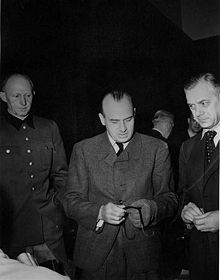 Frank (center, wearing a glove after an unsuccessful suicide attempt shortly after his arrest) at the Nuremberg trial, with Alfred Jodl and Alfred Rosenberg
Frank (center, wearing a glove after an unsuccessful suicide attempt shortly after his arrest) at the Nuremberg trial, with Alfred Jodl and Alfred Rosenberg
Frank was captured by American troops on 3 May 1945, at Tegernsee in southern Bavaria. Upon his capture, he tried to cut his own throat; two days later, he lacerated his left arm while attempting to slit his wrists in a second unsuccessful suicide attempt. He was indicted for war crimes and tried before the International Military Tribunal in Nuremberg from 20 November 1945 to 1 October 1946. During the trial he renewed the faith of his childhood, Roman Catholicism, and claimed to have a series of religious experiences.
Frank voluntarily surrendered 43 volumes of his personal diaries to the Allies, which were then used against him as evidence of his guilt.[21] Frank confessed to some of the charges put against him and viewed his own execution as a form of atonement for his sins. Although on the witness stand he expressed remorse, during the trial, he vacillated between penitence for his crimes and blaming the Allies, especially the Soviets, for an equal share of wartime atrocities.
The former Governor-General of Poland was found guilty of war crimes and crimes against humanity on 1 October 1946, and was sentenced to death by hanging. While awaiting execution, he wrote his memoirs. The sentence was carried out on 16 October by Master Sergeant John C. Woods. Journalist Howard K. Smith wrote of the execution:
“ Hans Frank was next in the parade of death. He was the only one of the condemned to enter the chamber with a smile on his countenance. And, although nervous and swallowing frequently, this man, who was converted to Roman Catholicism after his arrest, gave the appearance of being relieved at the prospect of atoning for his evil deeds.[22] ” He and Albert Speer were allegedly the only defendants to show remorse for their war crimes.[23] "My conscience does not allow me simply to throw the responsibility simply on minor people... A thousand years will pass and still Germany's guilt will not have been erased."[24] But four months later he insisted in his final statement, that the guilt of the Germans had been wiped out by the crimes inflicted upon them: "There is still one statement of mine which I must rectify. On the witness stand I said that a thousand years would not suffice to erase the guilt brought upon our people because of Hitler's conduct in this war. Every possible guilt incurred by our nation has already been, completely wiped out today, not only by the conduct of our war-time enemies towards our nation and its soldiers, which has been carefully kept out of this Trial, but also by the tremendous mass crimes of the most frightful sort which-as I have now learned-have been and still are being committed against Germans by Russians, Poles, and Czechs, especially in East Prussia, Silesia, Pomerania, and Sudetenland. Who shall ever judge these crimes against the German people?"[25] He answered to his name quietly and when asked for any last statement, he replied "I am thankful for the kind treatment during my captivity and I ask God to accept me with mercy."[22]
Family
On 2 April 1925 Frank married 29-year-old secretary Brigitte Herbst (1895–1959) from Forst (Lausitz). The wedding took place in Munich and the couple honeymooned in Venetia. Hans and Brigitte Frank had five children:
- Sigrid Frank (born 13 March 1927, Munich)
- Norman Frank (born 3 June 1928, Munich)
- Brigitte Frank (born 13 January 1935, Munich)
- Michael Frank (born 15 February 1937, Munich)
- Niklas Frank (born 9 March 1939, Munich)
Brigitte Frank had a reputation for having a more dominant personality than her husband, and from 1939 she called herself "a queen of Poland" ("Königin von Polen"). The marriage was unhappy and became colder from year to year. When Frank sought a divorce in 1942, Brigitte gave everything to save their marriage in order to remain the "First Lady in the General Government". One of her most famous comments was "I'd rather be widowed than divorced from a Reichsminister!" Frank answered: "So you are my deadly enemy!"[26]
In 1987, Niklas Frank wrote a book about his father, Der Vater: Eine Abrechnung ("The Father: A Settling of Accounts"), which was published in English in 1991 as In the Shadow of the Reich. The book, which was serialized in the magazine Stern, resulted in controversy in Germany because of the scathing way in which the younger Frank depicted his father, referring to him as "a slime-hole of a Hitler fanatic" and questioning his remorse before his execution.[27]
Quotations
In a 1940 interview in the Völkischer Beobachter:
“ In Prague, big red posters were put up on which one could read that seven Czechs had been shot today. I said to myself, 'If I had to put up a poster for every seven Poles shot, the forests of Poland would not be sufficient to manufacture the paper.'[28] ” About Polish partisans in Warsaw in 1943, he spoke from Kraków, stating:
“ If not for Warsaw in the General Government, we wouldn't have 4/5 of our current problems on that territory. Warsaw was and will be the center of chaos and a place from which opposition spreads throughout the rest of the country.[citation needed] ” “ A thousand years will pass and still Germany's guilt will not have been erased.[29] ” “ There is still one statement of mine which I must rectify. On the witness stand I said that a thousand years would not suffice to erase the guilt brought upon our people because of Hitler's conduct in this war. Every possible guilt incurred by our nation has already been, completely wiped out today, not only by the conduct of our war-time enemies towards our nation and its soldiers, which has been carefully kept out of this Trial, but also by the tremendous mass crimes of the most frightful sort which-as I have now learned-have been and still are being committed against Germans by Russians, Poles, and Czechs, especially in East Prussia, Silesia, Pomerania, and Sudetenland. Who shall ever judge these crimes against the German people?"[30] ” Portrayal in the media
Hans Frank has been portrayed by the following actors in film, television and theater productions.[31]
- Hans Schwarz Jr. in the 1954 West German film Geld aus der Luft
- Lothar Bellag in the 1968 East German television miniseries Wege übers Land.
- Voja Miric in the 1971 Yugoslavian television production Nirnberski epilog
- Jerzy Duszyński in the 1976 Polish film Ocalić miasto
- John Bailey in the 1978 United States television production Holocaust
- Robert Austin in the 1984 United States television production Pope John Paul II
- Frank Moore in the 2000 Canadian/U.S. T.V. production Nuremberg
- Matt Craven in the 2005 Polish television production Karol, un uomo diventato Papa
- Andreas Conrad in the 2005 German T.V. miniseries Speer und Er.
- Harald Posch in the 2005 Italian/U.S./Polish television production Pope John Paul II
- Will Keen in the 2011 BBC production The Man Who Crossed Hitler
See also
- Glossary of Nazi Germany
- List of Nazi Party leaders and officials
- The Holocaust in Poland
- Command responsibility
References
- ^ Rosenbaum, Ron (1998). Explaining Hitler, New York: Random House, pp. 21-22.
- ^ Dieter Schenk (2006). Frank: Hitlers Kronjurist und General-Gouverneur, p. 65. ISBN 978-3-10-073562-1: "Dass Adolf Hitler bestimmt kein Judenblut in den Adern hatte, scheint mir aus seiner ganzen Art dermaßen eklatant bewiesen, dass es keines weiteren Wortes bedarf," (p. 330 of Frank's memoirs published in 1953 as Im Angesicht des Galgens. Deutung Hitlers und seiner Zeit aufgrund eigener Erlebnisse und Erkenntnisse).
- ^ "Hatte Hitler jüdische Vorfahren?". Holocaust-Referenz. http://www.h-ref.de/personen/hitler-adolf/vorfahren/hitlers-abstammung.php.
- ^ "Was Hitler part Jewish?". The Straight Dope. April 9 1993. http://www.straightdope.com/columns/read/797/was-hitler-part-jewish.
- ^ "Was Hitler Jewish?". Jewish Virtual Library. http://www.jewishvirtuallibrary.org/jsource/Holocaust/hitlerjew.html.
- ^ Rosenbaum, Ron (1998). Explaining Hitler, New York: Random House, pp. 24-25.
- ^ Rosenbaum, Ron (1998). Explaining Hitler, New York: Random House, p. 21.
- ^ Rosenbaum, Ron (1998). Explaining Hitler, New York: Random House, pp. 21 & 30-31.
- ^ Rosenbaum, Ron (1998). Explaining Hitler, New York: Random House, p. 30.
- ^ Rosenbaum, Ron (1998). Explaining Hitler, New York: Random House, p. 31.
- ^ Rosenbaum, Ron (1998). Explaining Hitler, New York: Random House, p. 25.
- ^ Evans, Richard J. (2004). The Coming of the Third Reich. Penguin Press, p. 179. ISBN 978-1-59420-004-5
- ^ Wheeler-Bennett, John (1967). The Nemesis of Power, Macmillan: London, p. 216.
- ^ Wheeler-Bennett, John (1967). The Nemesis of Power, Macmillan: London, pp. 216-220.
- ^ See Martyn Housden, Hans Frank's Opposition to the SS: Social Behavior, Consistency and the Power of the Situation, University of Bradford.
- ^ Quoted in Evans, Richard J. (2005). The Third Reich in Power. Penguin Press, p. 73. ISBN 978-1-59420-074-8
- ^ Wroński, T. (1974). Kronika okupowanego Krakowa. Wydawnictwo Literackie, p. 320.
- ^ Dąbrowa-Kostka, S. (1972). W okupowanym Krakowie. Wydawnictwo Ministerstwa Obrony Narodowej, pp. 160-167.
- ^ Hamilton, Charles. (1996). Leaders & Personalities of the Third Reich, Vol. 2. R. James Bender Publishing, p. 135.
- ^ "Hans Frank and Chess" by Edward Winter
- ^ Hans Frank case for de defence at Nuremberg trials
- ^ a b See Smith, "The Execution of Nazi War Criminals"
- ^ Gilbert, G. M. (1995). Nuremberg Diary. De Capo Press, p. 19. ISBN 978-0-306-80661-2
- ^ From the transcript of his cross-examination during his trial. See Testimony of Frank at Nuremberg
- ^ Nuremberg Trial Proceedings Volume 22: Saturday, 31 August 1946. Page 385: http://avalon.law.yale.edu/imt/08-31-46.asp
- ^ "Hans Frank - Pre-war career, Wartime career, Quotation, Fiction and film," in Cambridge Encyclopedia, Vol. 32. Retrieved 20 January 2008
- ^ See Frank, Niklas (1991). In the Shadow of the Reich. Knopf. ISBN 978-0-394-58345-7. See also Susan Benesch's Review in Washington Monthly, November 1991
- ^ Date of publication was 6 June 1940. Cited in Davies, N. (2003) Rising '44. Macmillan, London. p.84 ISBN 978-0-333-90568-5. A slightly different translation is given by Czapski, J. (1987). The Inhuman Land. London: Polish Cultural Foundation, p. 306. ISBN 978-0-85065-164-5: The occasion was a widely distributed proclamation in Czechoslovakia announcing the execution of seven Czech students. This is what he said: 'If I had to order a distribution of posters announcing such an event every time I order a shooting of seven Poles, there would not be enough trees in the Polish forests to supply the necessary paper.'
- ^ William L. Shirer. The Rise and Fall of the Third Reich, foreword. Simon and Schuster, New York, 1960.
- ^ Nuremberg Trial Proceedings Volume 22: Saturday, 31 August 1946. Page 385: http://avalon.law.yale.edu/imt/08-31-46.asp
- ^ "Hans Frank (Character)". IMDb.com. http://www.imdb.com/character/ch0062614. Retrieved 1 June 2008.
External links
Major defendants at the Nuremberg TrialsSentenced to death Imprisoned (terms) - Karl Dönitz (10 years)
- Walther Funk (life)
- Rudolf Hess (life)
- Konstantin von Neurath (15 years)
- Erich Raeder (life)
- Baldur von Schirach (20 years)
- Albert Speer (20 years)
Acquitted No decision 1 in absentia. 2 Committed suicide. 3 Found unfit to stand trial; charges dropped due to extremely poor health and senility.The Holocaust in Poland - Main article: The Holocaust
- Related articles by country:
- Belarus
- Estonia
- Latvia
- Lithuania
- Norway
- Russia
- Ukraine
Camps, ghettos and operations Camps ExterminationMass shootings Ghettos - List of 267 Jewish ghettos set up in German-occupied Poland (1939–1942)
- Będzin
- Białystok
- Brest
- Częstochowa
- Grodno
- Kraków
- Lvov (Lwów)
- Łódź
- Lubartów
- Lublin
- Międzyrzec Podlaski
- Radom
- Sosnowiec
- Warsaw
Other atrocities Perpetrators, participants, organizations, and collaborators Major perpetrators Organizers- Josef Bühler
- Eichmann
- Eicke
- Ludwig Fischer
- Hans Frank
- Globocnik
- Glücks
- Greiser
- Himmler
- Hermann Höfle
- Fritz Katzmann
- Wilhelm Koppe
- Friedrich-Wilhelm Krüger
- Kutschera
- Erwin Lambert
- Ernst Lerch
- Oswald Pohl
- Reinefarth
- Scherner
- Seyss-Inquart · Sporrenberg
- Streckenbach
- Thomalla
- Otto Wächter
- Wisliceny
Camp command- Aumeier
- Richard Baer
- Boger
- Braunsteiner
- Eberl
- Kurt Franz
- Karl Frenzel
- Karl Fritzsch
- Göth
- Grabner
- Hartjenstein
- Hering
- Höss
- Hössler
- Josef Kramer
- Liebehenschel
- Maria Mandel
- Matthes
- Michel
- Johann Niemann
- Oberhauser
- Reichleitner
- Heinrich Schwarz
- Stangl
- Gustav Wagner
- Christian Wirth
Gas chamber executioners- Erich Bauer
- Bolender
- Hackenholt
- Klehr
- Hans Koch
- Herbert Lange
Ghetto command- Wolfgang Birkner
- Blobel
- Felix Landau
- Schaper
- Schöngarth
- von Woyrsch
Personnel Camp guardsBy campOrganizations Collaborators JewishEstonian, Latvian,
Lithuanian, Belarusian
and UkrainianOther nationalities- Arajs Kommando
- Ukrainian Auxiliary Police
- Ukrainian collaboration
- Lithuanian Security Police
- Trawniki
- Ypatingasis būrys
- Pieter Menten
Resistance: Judenrat, victims, documentation and technical Organizations Uprisings Leaders Judenrat - Jewish Ghetto Police
- Adam Czerniaków
- Mordechai Chaim Rumkowski
Victim Lists Ghettos- Kraków
- Łódź
- Lvov (Lwów)
- Warsaw
Camps- Auschwitz
- Bełżec
- Chełmno
- Gross-Rosen
- Izbica
- Kraków-Płaszów
- Majdanek
- Sobibor
- Soldau
- Stutthof
- Trawniki
- Treblinka
Documentation Nazi sources- Auschwitz Album
- Frank Memorandum
- Höcker Album
- Höfle Telegram
- Katzmann Report
- Korherr Report
- Nisko Plan
- Posen speeches
- Special Prosecution Book-Poland
- Stroop Report
- Wannsee Conference
Witness accounts- Graebe affidavit
- Gerstein Report
- Vrba-Wetzler report
- Witold's report
ConcealmentTechnical and Logistics - Identification in camps
- Gas chamber
- Gas van
- Holocaust train
- Human medical experimentation
- Zyklon B
Aftermath, trials and commemoration Aftermath Trials West German trials- Frankfurt Auschwitz Trials
- Treblinka trials
Polish, East German, and Soviet trialsMemorials Righteous among the Nations - Polish Righteous among the Nations
- Rescue of Jews by Poles during the Holocaust
- Albert Battel
- Hermann Friedrich Graebe
- Andrey Sheptytsky
- Oskar Schindler
The Holocaust in Ukraine Main article: The Holocaust
Related articles by country: Belarus • Estonia • Latvia • Lithuania • Norway • Poland • RussiaCrimes Major perpetrators Paul Blobel • Werner Braune • Hans Frank • Friedrich Jeckeln • Ernst Kaltenbrunner · Fritz Katzmann • Erich Koch • Felix Landau • Otto Ohlendorf • Paul Otto Radomski • Otto Rasch • Walter Schimana • Otto Wächter • Dieter WislicenyNazi occupation and organizations Collaborators Individuals: Volodymyr Bahaziy • Petro Voinovsky • Petro Zakhvalynsky
Organizations: Schutzmannschaft • Ukrainian Auxiliary PoliceGhettos, camps and prisons Resistance and survivors Planning, methods,
documents and evidenceConcealment and denial War crimes investigations and trials Righteous among the Nations Memorials Categories:- 1900 births
- 1946 deaths
- People from Karlsruhe
- 20th-century Freikorps personnel
- German military personnel of World War I
- German lawyers
- German Roman Catholics
- Holocaust perpetrators
- People executed by hanging
- People executed by the International Military Tribunal in Nuremberg
- People from the Grand Duchy of Baden
- German people convicted of crimes against humanity
- Executed German people
- The Holocaust in Ukraine
- Thule Society members
- Nazi Germany ministers
- SS generals
Wikimedia Foundation. 2010.

